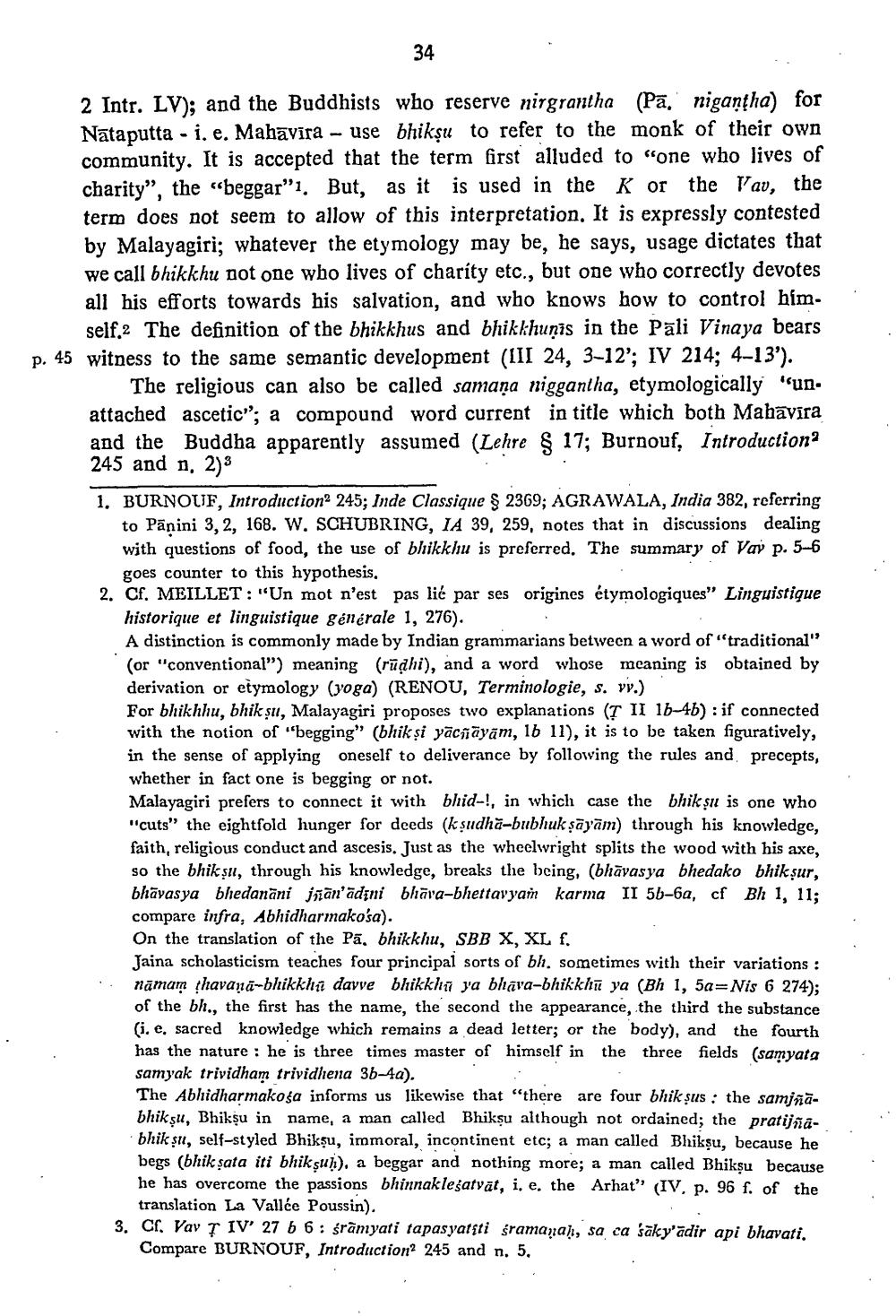________________
34
2 Intr. LV); and the Buddhists who reserve nirgrantha (Pa. nigantha) for Nataputta - i. e. Mahavira - use bhiksu to refer to the monk of their own community. It is accepted that the term first alluded to "one who lives of charity", the "beggar"ı. But, as it is used in the K or the Vav, the term does not seem to allow of this interpretation. It is expressly contested by Malayagiri; whatever the etymology may be, he says, usage dictates that we call bhikkhu not one who lives of charity etc., but one who correctly devotes all his efforts towards his salvation, and who knows how to control him.
self.2 The definition of the bhikkhus and bhikkhunīs in the Pāli Vinaya bears p. 45 witness to the same semantic development (11I 24, 3-12'; IV 214; 4-13').
The religious can also be called samana niggantha, etymologically "un. attached ascetic"; a compound word current in title which both Mahavīra and the Buddha apparently assumed (Lehre § 17; Burnouf, Introductiona 245 and n, 2)3
1. BURNOUF, Introduction2 245; Inde Classique $ 2369; AGRAWALA, India 382, referring
to Pāṇini 3, 2, 168. W. SCHUBRING, IA 39, 259, notes that in discussions dealing with questions of food, the use of blikkhu is preferred. The summary of Vav p. 5-6
goes counter to this hypothesis, 2. Cf. MEILLET: "Un mot n'est pas lié par ses origines étymologiques" Linguistique
historique et linguistique générale 1, 276). A distinction is commonly made by Indian grammarians between a word of traditional" (or "conventional") meaning (rūdhi), and a word whose meaning is obtained by derivation or etymology (yoga) (RENOU, Terminologie, s. vv.) For bhikhhu, bhikṣu, Malayagiri proposes two explanations (7 II 1b-4b) :if connected with the notion of "begging" (bhik şi yāciāyām, 1b 11), it is to be taken figuratively, in the sense of applying oneself to deliverance by following the rules and precepts, whether in fact one is begging or not. Malayagiri prefers to connect it with bhid-!, in which case the bhikṣul is one who "cuts" the eightfold hunger for deeds (ksudhà-bubhukṣāyām) through his knowledge, faith, religious conduct and ascesis. Just as the wheelwright splits the wood with his axe, so the bhikṣu, through his knowledge, breaks the being, (bhāvasya bhedako bhikṣur, bhāvasya bhedanāni jñān'adini bhāva-bhettavyan karma II 5b-6a, cf Bh 1, 11; compare infra, Abhidharmakosa). On the translation of the Pā, bhikkhu, SBB X, XL f. Jaina scholasticism teaches four principal sorts of bh. sometimes with their variations : nāmam thavana-bhikkhu davve bhikkhu ya blāva-bhikkhu ya (Bh 1, 5a=Nis 6 274); of the bh., the first has the name, the second the appearance, the third the substance (i, e, sacred knowledge which remains a dead letter; or the body), and the fourth has the nature : he is three times master of himself in the three fields (samyata samyak trividham trividhena 3b-4a). The Abhidharmakoga informs us likewise that "there are four bhiksus: the samjñābhiksu, Bhiksu in name, a man called Bhiksu although not ordained; the pratijnabhik su, self-styled Bhiksu, immoral, incontinent etc; a man called Bhikṣu, because he begs (bhik sata iti bhik suh), a beggar and nothing more; a man called Bhiksu because he has overcome the passions bhinnaklegatyát, i.e. the Arhat" (IV, p. 96 f. of the
translation La Vallée Poussin). 3. Cf. Vav T IV 27 6 6: śrāmyati tapasyarsti sramanah, sa ca sāky'adir api bhavati,
Compare BURNOUF, Introduction2 245 and n. 5,




